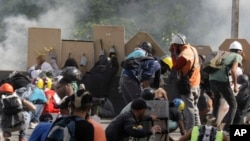Top diplomats from across the Western Hemisphere fell short Wednesday in their bid to reach agreement about how to address Venezuela's deteriorating democratic crisis, with some countries insisting that foreigners had no right to intervene in Venezuela's internal affairs.
An emotional gathering of the Organization of American States ended with no consensus, other than an agreement to keep talking. Unable to secure enough support for either of two draft resolutions, the foreign ministers said they'd reconvene in a few weeks.
The failure came despite the urgent pleas from some nations represented at the extraordinary meeting in Washington, where foreign ministers broadly shared one hope: that Venezuela, which has vowed to leave the regional group in protest of its potential intervention, would reconsider. Beyond that, there were few points of agreement.
“We're talking about people dying, dying,” said Brazil's Foreign Minister Aloysio Nunes. He argued that democracy was “not a luxury” and asked plaintively: “What can we do collectively to make a difference, to reach out to the Venezuelan citizens, to rescue their fundamental freedoms?”
But left-leaning nations that have been sympathetic to Venezuelan President Nicolas Maduro insisted the OAS had no business interfering in the crisis, in which protests against Maduro's government have left at least 60 people dead. Nicaraguan diplomat Luis Alvarado said his country condemned and rejected the attempt to “subvert the rights” of a sovereign country.
“We demand the end of the political lynching,” Alvarado said through a translator. “Nothing can be imposed on the great and sovereign nation of Venezuela. It is absolutely essential that these actions cease.”
His comments were echoed by Bolivia's Foreign Minister Fernando Huanacuni Mamani, who accused the OAS of choosing “aggression” and “confrontation.”
In New York Wednesday, Venezuelan Foreign Minister Delcy Rodriguez said Maduro's opponents should feel “deeply frustrated” that the U.S.-led plan to intervene in Venezuela's crisis had failed.
“The only consensus from this meeting is that there is no consensus,” Rodriguez said.
She said that despite Maduro's decision to withdraw from the OAS, he instructed her to attend the organization's General Assembly, taking place in a few weeks in Mexico, where the region's foreign ministers will likely once again grapple with the country's crisis.
Protesters have flooded the streets of Venezuela for months - including on Wednesday - demanding new elections and faulting Maduro's leadership for the country's triple-digit inflation, surging crime rates, and dire shortages of food and medicine. The opposition accuses Maduro of putting Venezuela on a path toward full-on authoritarianism.
Maduro has vowed to resolve the crisis by forming a special assembly to rewrite the constitution, a proposal protesters have rejected as yet another attempt by Maduro to consolidate power. Maduro's opposition says the process outlined by Maduro for selecting the assembly is designed to skew it in his favor by stacking the assembly with his supporters.
At Wednesday's meeting in Washington, foreign ministers considered two draft resolutions. Both drafts called for a reduction in violence but differ in their wording on other demands for Maduro to change course.
But after pausing the meeting for an hour, as diplomats tried to secure enough support to pass either of the drafts, it became clear they would fall short, and the meeting abruptly ended. The next gathering of the OAS is scheduled to start on June 19 in Cancun, Mexico.
Secretary of State Rex Tillerson, the top U.S. diplomat, did not attend the meeting at OAS headquarters, just a few blocks from Tillerson's State Department offices. In his stead, he sent Tom Shannon, the U.S. undersecretary of state for political affairs, who urged Venezuela to stay in the group and defended its right to try to resolve the crisis.
“We believe there is an international role in the rebuilding of trust among the main political actors in Venezuela as well as the reduction of tensions,” Shannon said.




